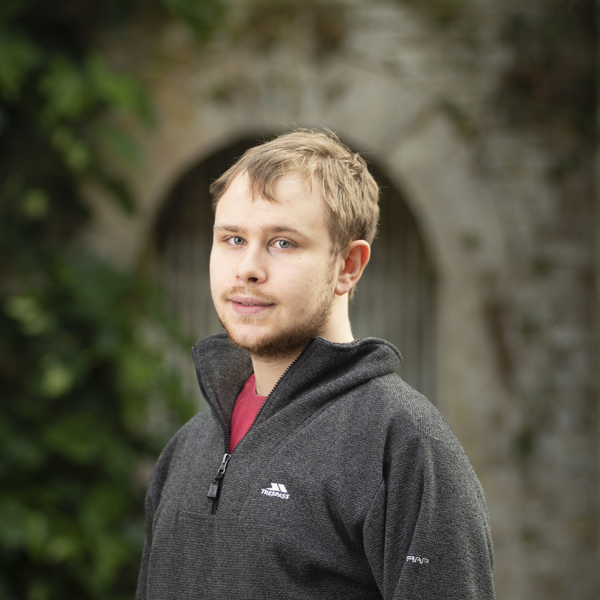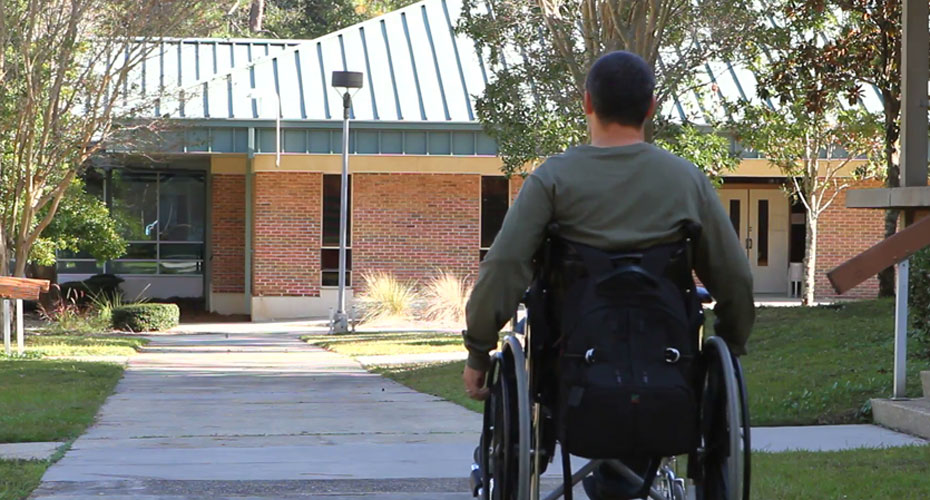Exeter campuses
Students in Exeter with disabilities and long-term health conditions are supported by Wellbeing Services. To declare a disability, email wellbeing@exeter.ac.uk
Penryn Campus
Students in Cornwall can find lots of advice and information on our disability support pages or contact the accessibility team here.
Rebecca is in her third year at the University of Exeter. In her first year she almost quit university as she was living with an undiagnosed condition called fibromyalgia. After being diagnosed, Rebecca got help from the University’s AccessAbility service, which provided wellbeing support as well as academic assistance. This support has helped Rebecca turn her life around and flourish at university.
Students with disabilities
We are committed to providing a learning environment which gives all of our students the support they need to thrive at university. We support students with long-term disabilities, including chronic medical conditions, physical and sensory impairments, learning differences and those with ASC.
What is classified as a disability?
The Equality Act 2010 gives the definition of disability as follows:
‘A person has a disability if they have a physical or mental impairment, and the impairment has a substantial and long-term adverse effect on his or her ability to carry out normal day-to-day activities.’
If you want to find out more about what it means to declare a disability, take a look at our website.
The University supports students with a chronic medical condition, a physical or sensory impairment, mental health difficulties or specific learning difficulty. For further information on support for students with mental health difficulties, see our mental health advice page.
Preparing for University
If you are considering the University of Exeter as one of your university choices and want to know more about the support available, you may benefit from coming along to one of our Open Days and meeting with members of our Wellbeing Team at their stand in the information fair to discuss your needs in person. You can also access information about our range of Wellbeing services online.
Our friendly and helpful staff can advise on how you can apply for Disability Support Allowance (DSA). Students who have applied for DSA can attend a study needs assessment at any designated centre around the country with the aim of having all the support you need ready and in place for when you start university.
Before you arrive
We aim to create an environment which welcomes those with physical disabilities and those with unseen disabilities enabling them to participate fully in university life.
Through our Wellbeing service we ensure that students with disabilities are able to participate fully in campus activities and encourage you to declare your disability on your UCAS application form. This doesn’t affect your application, but it does help us to prepare for your arrival and plan your support.
If we have offered you a place to study, we will get in touch during the admissions process to encourage you to contact us if you have a disability which may affect your studies. The team can then put plans in place to provide the support that you may need whilst at university.
Autism Spectrum Conditions (ASC) transition days:
This event is aimed at students with autism spectrum conditions, including Asperger Syndrome, or those who identify with the diagnosis, and is hosted by AccessAbility services. Find out more on our website.
We commonly see students with a variety of long-term health conditions, disabilities and mental health difficulties. We encourage you to get in touch if you have a long-term health condition (including mental health), disability, or specific learning difficulty so that we are able to ensure that you have access to the appropriate support whilst at University.
We provide our students with a range of support, including advice on the Disabled Students' Allowance. We can provide advice on funding sources and support, and offer diagnostic assessments where there may be indications of a specific learning difficulty such as dyslexia or dyspraxia.
If you are studying in Devon at one of our Exeter campuses, contact the Wellbeing Services to make an appointment a team of disability specialists dedicated to supporting students with a disability or long-term health condition including Specific Learning Difficulties and Autism Spectrum Conditions. Wellbeing Services in Exeter also includes the Exeter Access Centre.
Students based on our Cornwall Campuses in Penryn and Truro please visit the Cornwall disability support pages for support and guidance. You can also contact the accessibility team here.
In most cases, the initial meeting will be an appointment to put in place an Individual Learning Plan (ILP). This appointment focuses on how your disability impacts on your ability to study and manage at University and to consider any reasonable adjustments the University may be able to offer to support you.
Individual Learning Plans
An Individual Learning Plan (ILP) is a document that informs Colleges within the University of the recommended reasonable adjustments that may be put in place once you have declared a disability. To have an ILP put in place, you must have a health condition or disability which fits the criteria to be classified as a disability under the Equality Act 2010, (i.e. has or likely to last over a year). The legislation states that students with health conditions that meet the criteria of having a disability, are entitled to additional support.
Disabled Students' Allowance (DSA)
Most UK students with a physical disability or mental health difficulty, long term health condition or specific learning difficulty will be able to apply for Disabled Students’ Allowance which can help towards the cost of specialist equipment, one-to-one support and other costs associated with your condition. If you feel this applies to you, you are encouraged to apply as early as possible as the whole process can take up to 12 weeks. If you complete an application and are not eligible for DSA, please make an appointment with a practitioner in the relevant pathway to discuss alternative funding and support.
If you qualify for DSA, you will become eligible for a range of additional support such as:
- Employability support – including one to one consultancy and specific programmes of support
- Paid internships through the A2I scheme - support for disabled students under the scheme includes liaison with the employer if required and follow-ups to ensure a successful internship.
Personal Care cannot be funded through DSA, although Adult Services in your area may be able to help.
If you need any further guidance, please download a guide on applying for Disabled Students' Allowance.
International students
All students are eligible to receive advice and support from Wellbeing Services irrespective of funding. Although non-UK based students are not eligible for funding through DSA, there may be other sources of funding. Many students coming to the UK to study are eligible for funding through their home government; this is usually applied for before you begin your programme of study.
Assessor Information
Information for DSA Assessors regarding what support can be offered by the University of Exeter can be found here:
Accommodation support
Students who might incur additional costs for en-suite or studio accommodation as a direct result of a disability may be eligible for a subsidy towards those costs on disability grounds. The subsidy is only applicable to students who are applying as residents in accommodation where the University issues the contract. For full information on this process and the criteria for application, please refer to the Accessible Accommodation webpage.
There are many ways that we may be able to provide support to help you navigate university life more easily if you have a disability or mental health need. This may include:
- Bookable accessible library space on referral for students with disabilities and mental health needs. The rooms have adjustable desks and specialist assistive technology.
- One-to-one Specialist Study Skills tuition and support is available for students with Specific Learning Difficulties (SpLD), including dyslexia and dyspraxia via AccessAbility.
- Mentoring is available to students with Autism Spectrum Conditions to support them with overcoming obstacles to learning, and with adjusting to University life.
- Working with our Timetabling team to ensure students with physical disabilities are taught in accessible learning spaces
Exam adjustments
After you have discussed your needs in an appointment with Wellbeing Services, and provided supporting evidence stating your needs, we may be able to help by putting reasonable adjustments for examinations in place.
Careers
A wide variety of employers display the "double tick" symbol on their recruitment literature and is worth looking out for. Our Careers website provides advice, guidance and useful resources.
We advise getting in touch with us if you have any concerns about how your diability may be affecting your studies or mental health. Advice, information, signposting to services and practical support is available through the Wellbeing Services and the AccessAbility pathway in particular. Students in Cornwall can find information on disability support here and contact the Cornwall accessibility team here.
Urgent support
The Wellbeing Team will liaise with local NHS services to ensure that appropriate support is in place from the minute students arrive. Find out more on our Devon Urgent Support or Cornwall Urgent Support pages.
Specific learning difficulties
AccessAbility provides support for students with the following specific learning difficulties:
- Dyslexia
- Dyspraxia
- Attention Deficit (Hyperactivity) Disorder (ADD/ADHD)
- Dysgraphia
Autism spectrum
AccessAbility provides a range of support for students with Autism Spectrum Conditions (ASC) such as Asperger’s Syndrome.
Support groups and societies
There are a number of support groups and societies available on campus. At our Penryn Campus in Cornwall, the Students Union run a variety of student services for those with disabilities and can point you in the direction of help and advice, or contact their Student Voice team.
Every aspect is geared up to help people with a disability

I love every aspect of the university experienced offered at Exeter. The level of support offered in terms of academic, accessibility and accommodation, means every aspect of Exeter is geared up to help people with a disability.
AccessAbility put together an Individual Learning Plan for me. This means that I can access additional support to ensure that I am not disadvantaged in exams or in class. For example, I am entitled to have access to recordings even if they aren’t generally available because it can be difficult to write everything down in lectures. It’s really important to make sure the university support you through your academic journey. If you have the drive you are going to go out and do your best to succeed here.
Dan from Dorset studying Politics BA.
Dan completed an additional year of sixth form to complete one of his A-Levels having initially chosen a subject which he struggled with because of his disability.

